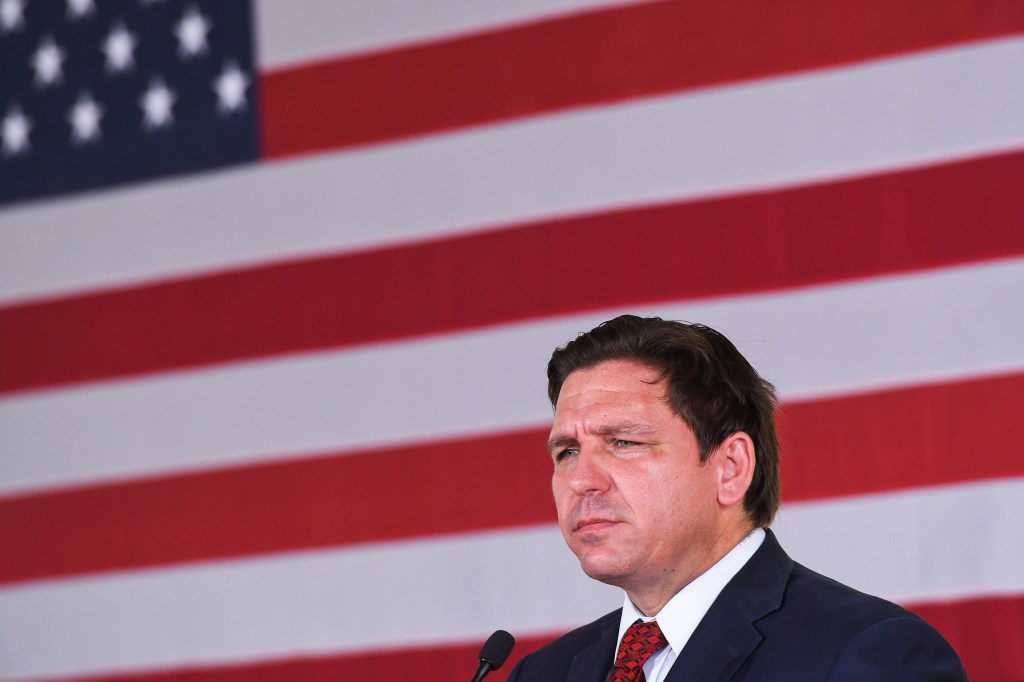Less than two months before Hurricane Ian swept across Florida, its governor, Ron DeSantis, referred to ESG investing as a danger to economic freedom.
His office even released a statement saying the practice sought to “advance a woke ideological agenda,” and that investors taking into account environmental, social and governance-related matters into their decisions were part of the “corporate cartel elites,” whose “victims” include conservative Americans, those who support the Second Amendment and soon-to-be retirees.
Naturally, he then proposed that Florida State Board of Administration fund managers should be banned from taking ESG data into account while investing Florida pension money.
By September, Florida was hit by Hurricane Ian, one of the strongest storms to make landfall in the state in recent memory. Towns were decimated, people died and roadways collapsed.
DeSantis, who once opposed an aid package for the victims of Hurricane Sandy, called upon President Joe Biden for relief. He’s walking a fine line in addressing the aftermaths of climate-exacerbated disasters while keeping just enough distance to pander to his base.
One might assume ESG investing would be popular in Florida, given its coastal status, history of deadly storms and increased likelihood of having cities flooded by the ocean. The Sunshine State stands to see an earlier and more destructive impact from climate change than other areas of the U.S.
ESG investing, in this sense, could affect its climate crisis, even if modestly.
Yet the topic of ESG investing is caught in the webs of a right-wing political movement. It’s too ironic that states such as Florida and Texas, which are likely to experience some of the most severe consequences of climate change, are stuck with leaders seemingly doing all they can to make matters worse.
Texas Comptroller Glenn Hegar — he’s basically the state accountant — banned state pension funds from investing in financial institutions that expressed interest in divesting from fossil fuels. This is an attack on a core pillar of ESG investing that pushes for companies to wean off of fossil fuels in favor of cleaner energy.
Aside from threatening the world’s economic stability, Texas’ support for fossil fuels is awfully shortsighted; burning them is one of the leading causes of the current climate crisis and myriad environmental problems, which, in turn, lead to relentless humanitarian disasters. Texas should know, as it has faced, in the past decade alone, a catastrophic hurricane that killed more than 100, snowstorms that trapped thousands and heat waves that nearly knocked the state’s power grid offline.
West Virginia State Treasurer Riley Moore has also embraced anti-ESG legislation, barring five financial institutions that have expressed disinterest in coal and fossil fuels from conducting business with the state. The landlocked state suffers from flooding-induced landslides and is also facing severe heat waves.
Policies like these from Republican-controlled states are only growing as the midterm elections loom. The Republican-majority Arizona State Board of Investments has already banned fund managers from considering ESG factors when investing, and Oklahoma and Kentucky have also told state government entities to divest from financial companies that support ESG principles.
Economic pressure is the easiest way to maintain and sustain control, though, in the case of ESG bans, human lives are the bartering chip. Some cities in Arizona are on their way to becoming uninhabitable because of climate crisis-induced heat. One report found that changing temperatures and rainfall are altering the landscape of forests in Kentucky, which could lead to a decline in certain tree species, leaving an ecosystem insufficient to support life. Oklahoma, meanwhile, is facing droughts and wildfires.
These states need ESG investing to find economic support, solutions and funding that help better their environments, residents, and, thus, the nation. Barring ESG initiatives is not just counterproductive and dangerous — it’s fiscally foolish. There is money to be made in clean energy and environmental investing, and these Republicans know that. In many cases, ESG funds outperform the wider market.
Johannes Lenhard, the co-founder of VentureESG, noted that the amount of venture dollars spent in Florida and Texas is still very low, meaning any regulation will impact only a small amount of overall venture capital. He added though that states looking to ban ESG investing might face tension from the increasing number of LPs now committed to adopting such a mandate, especially since state funds are often LPs in many venture capital firms.
“ESG makes us aware of and keeps track of non-financial metrics, such as the impact of business and climate,” Lenhard told TechCrunch, adding that banning ESG and impact investing will have devastating effects on local climate mitigation efforts and worsen inequality.
“Banning such considerations is not only going to have long-term negative effects … it is also going against what Republicans usually stand for — increasing growth and profits.”
Lisa Calhoun, a founding managing partner at Valor Ventures, echoed similar sentiments, saying that Southern states could score huge economic wins if they encouraged investors to start allocating their dollars with inclusion in mind. Doing so is also one way to spur innovation in the region.
“There’s a false narrative that prioritizing inclusion, like explicitly supporting gender and racial equity, or setting sustainability goals, will hurt scaling more of the high-impact, high-job creation tech companies the region wants,” she told TechCrunch. “The truth is exactly the opposite. Most of the iconic companies created in this region have inclusion at the core and were founded by diverse teams.”
Of course, discouraging ESG investments is just one small piece of the conservative climate apathy pie. It all starts to add up, though.
In a sense, DeSantis was correct when he indicated that soon-to-be-retirees, conservative Americans and those who “fill up their gas tanks” are victims. Fort Meyers, located in a red congressional district, was once a haven for the elderly to spend their golden years. Now, there’s little left.































Comment